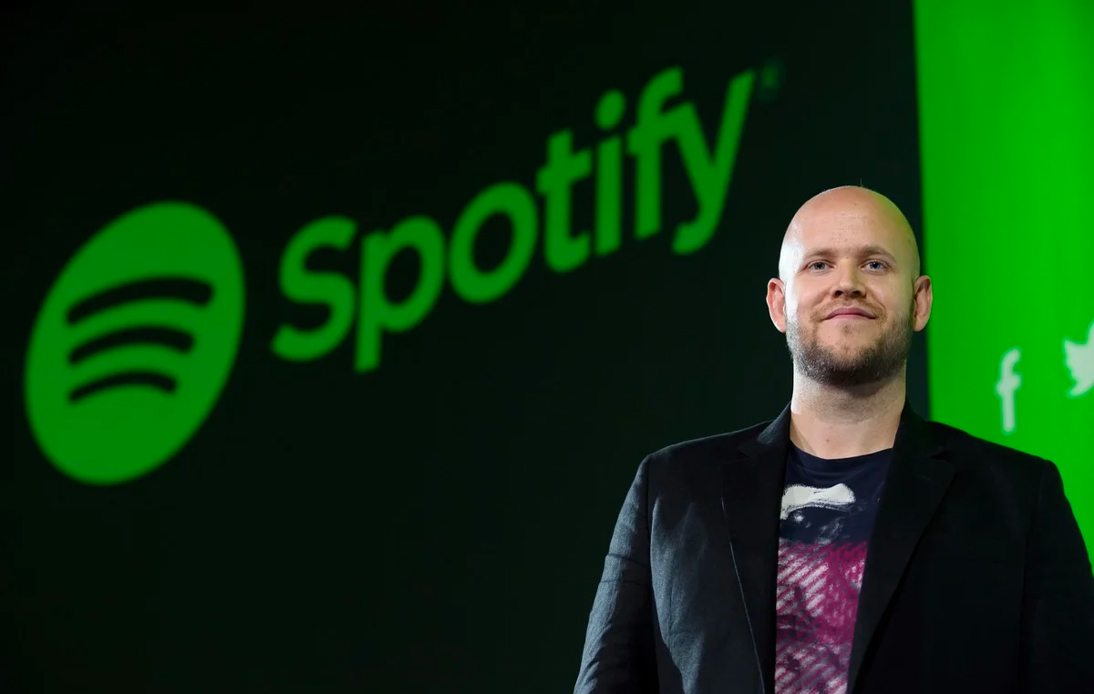
Spotify’s chief, Daniel Ek, asserted that there is currently no intention to entirely prohibit AI-generated content on the music streaming service.
Previously, a song featuring AI replicas of Drake and The Weeknd’s voices was removed from the platform.
Speaking to the BBC, Ek mentioned that while there are legitimate applications of technology in music production, utilizing AI to mimic human artists without permission is unacceptable.
He stated that the use of AI in music would probably be a topic of discussion for “many, many years.” Ek, who rarely engages with the media, identified three categories of AI application:
-Enhancing tools like auto-tune, which he deems permissible.
-Tools that replicate artists, which are unacceptable.
-A debatable category where AI-created music is evidently inspired by real artists but doesn’t impersonate them directly.
Addressing the complexities this presents to the industry, he commented, “It is going to be tricky.”
Although AI is not universally prohibited on Spotify, the service restricts the use of its content for training AI or machine learning models that can subsequently generate music. More and more artists are raising their voices against the incorporation of AI in creative fields.
Recently, musician Hozier from Ireland expressed willingness to protest against AI’s threat to his career. He expressed his uncertainty about whether the technology aligns with the concept of art.
Neither Drake nor The Weeknd were informed about the AI renditions of their voices in the song, “Heart on My Sleeve,” which was subsequently withdrawn from all streaming services in April.
The creator, Ghostwriter, later attempted to secure a Grammy nomination for the track but was rejected. Ek highlighted the potential for fraudulent uploads and emphasized the company’s dedication to addressing these issues with a specialized team.
In a separate context, the Financial Times disclosed that Spotify eliminated thousands of songs after detecting bot-driven streaming figure manipulation.
Additionally, Ek talked about Spotify’s substantial venture into podcasts, citing various levels of success with different high-profile creators.
He reflected on Spotify’s growth in podcasting, saying, “Five years ago Spotify was nowhere in podcasting.”
The company also assured that unless it violated the platform’s terms and conditions, Russell Brand’s podcast would persist on Spotify. Acast, the owner of the podcast, has halted its advertising revenue amidst ongoing investigations concerning the comedian.
During his visit to the UK, Sweden-based Ek conversed about regulatory measures, expressing support for upcoming online safety and digital market legislations aimed at enhancing internet safety and market competition.
Mr. Ek has consistently expressed criticism of the app store policies of both Apple and Google, platforms that are crucial for Spotify.
Both firms impose a 15% commission fee on in-app purchases for smaller developers, and this fee escalates to 30% for developers generating revenue exceeding $1m.
Spotify has also voiced grievances regarding the challenges posed by Apple in establishing direct communication with customers and endorsing its services on different platforms.
“We are in a situation where literally two companies in the world control how over four billion consumers access the internet,” stated Mr Ek.
“If you think now on a company like Spotify, where we already pay out almost 70% of our revenues back to the creative community, if we were to take the 30% out of our cut it essentially means we’re left with zero, which means we have to close shop.”
In April, following a 2020 complaint from Spotify, the European Commission (EC) accused Apple of infringing EU competition laws. However, in February, the EC moderated its complaints against Apple, with a conclusive decision still pending.
Apple maintained its ongoing collaboration with the EC and highlighted that the predominant segment of European developers, earning less than $1m in revenue, are subject to a 15% commission rate.





















